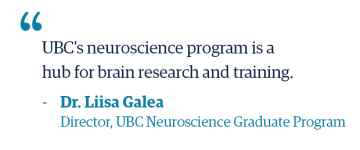
Liisa Galea. Photo: Djavad Mowafaghian Centre for Brain Health
When UBC’s neuroscience graduate program needed a new leader, Dr. Liisa Galea raised her hand without hesitation.
As a longstanding champion of neuroscience and the first PhD in Neuroscience to graduate from Western University, Galea sees this role as a way to give back to the neuroscience community.
A neuroscientist and professor in psychology at UBC, Galea specializes in how sex hormones, stress and biological factors influence brain health and disease in both men and women. For Galea, who has been actively teaching and supervising in the graduate program since 1998, this position is vital in uniting scholars from different neuroscience disciplines.
“UBC’s neuroscience program is a hub for brain research and training,” says Galea, who is a member of the Djavad Mowafaghian Centre for Brain Health. “Our 80+ faculty members are leaders in the field of neuroscience and they bring a diversity of perspectives to more than 100 graduate students in the program.”
 From investigating how resistance training improves brain plasticity, to examining recovery from stroke, to understanding the causes of mental illness,addiction and neurological disorders, to studying the ethical implications of new technologies and the role of gut microbiota on brain health, students in the program are exposed to different aspects of neuroscience.
From investigating how resistance training improves brain plasticity, to examining recovery from stroke, to understanding the causes of mental illness,addiction and neurological disorders, to studying the ethical implications of new technologies and the role of gut microbiota on brain health, students in the program are exposed to different aspects of neuroscience.
Galea says that interdisciplinary research collaborations are essential to grow the program and the field.
“Diversity breeds discovery—and the students discover that for themselves,” says Galea. “They’re taking challenging courses and many maintain lifelong friendships because of the intense type of study they’ve gone through together. Research collaborations are also formed between students that may not have discovered each other had they been siloed in another discipline. Students have supervisors who come from broad range of disciplines such as neuroethics, neuroimaging, psychology, psychiatry, neurology, physics, cellular physiology and anatomy.”
As the program director, Galea wants to create a dialogue about the other career options MSc or PhD neuroscience graduates can have outside academia.
“95 percent of our graduates go on to have a wide-range of careers, not just in academia,” says Galea. “While academia is important, there is so much students can do. Our graduates are trained in research, writing, and critical thinking. They have careers in pharmaceuticals, publishing, and policy. And because of its interdisciplinary nature, many graduates have careers in health care.”
As a strong advocate of the Fundamental Science Review, Galea also wants to improve the funding that students receive. To do this, she aims to put spotlight on how to better to support graduate students.
“Students are taking on jobs to support themselves and it’s very demanding. We want them to be able to focus on their research,” says Galea. “Our Four-Year Fellowships aren’t enough to sustain our students and support them in their graduate studies. Other universities, in more affordable cities, do a much better job at this. We need more provincial and federal support.”
Galea also wants to continue to build a sense of community with the students and the faculty in UBC’s neuroscience community. The program has an active social life that merges science and fun. From regular research colloquia and neuroscience extravaganzas to pub nights, socials and retreats, the community is strong and continues to grow with new enrollment averaging 25 students a year.
“I hope to start a regular ‘hike for brain health’,” says Galea. “The first one is scheduled for September 24 and open to all. We have to take time for ourselves and leverage the beauty of our city to advance brain health!”
RELATED
For more information on the Neuroscience Graduate Program program visit neuroscience.ubc.ca
For more information on the Djavad Mowafaghian Centre for Brain Health visit centreforbrainhealth.ca